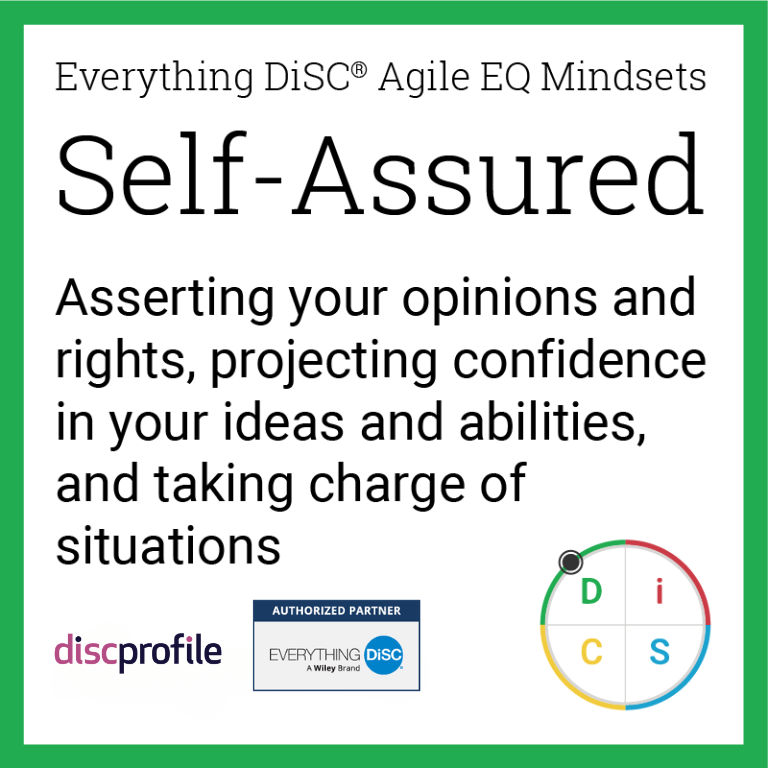How to be More Self-Assured

If you are not a naturally self-assured person, this quality may feel elusive to you. How can other people speak out so confidently, even when no one else agrees? Where does their courage come from? Why aren’t they as phased by setbacks? Let’s look at ways to practice self-assuredness, even if it doesn't come naturally to you.
Key Takeaways
- People with self-assured personalities project confidence and don't hesitate to take charge.
- People of all personality types may want to call upon the self-assured mindset when they need to make their needs known, signal conviction, or lead a team.
- You can practice being more self-assured by recognizing the thoughts standing in your way, setting goals, and practicing.
- Practice a self-assured personality by being OK with making mistakes, using language that projects confidence, and taking charge even if you don't feel like an expert, among other tips.
All people have some mindsets that come naturally, and some that take more effort to tap into. No one mindset is better than another, or more indicative of emotional intelligence. Rather, all tendencies are valuable at different times, depending on the demands of the situation at hand.
Self-assured meaning
“I don’t hesitate to take charge.”
Self-assured people are direct and firm communicators who project confidence (even when they don’t feel it). You can count on them to say what they mean and mean what they say. These assertive folks tend to spend less energy than most worrying about ruffling feathers.
Everything DiSC® Agile EQ™
Self-assured people often step up to take charge even when they’re not officially in charge. Instead of asking what to do, they create a plan and take action. For them, making a mistake isn’t the end of the world. A mistake is a small price to pay for the rewards of going all in and sharing all they have to offer.
Self-assured is one of the eight Everything DiSC® Agile EQ™ mindsets, and tends to align with DiSC® D styles.
Which needs drive self-assured people?
People are naturally self-assured for a variety of reasons, depending on their DiSC styles and life experiences. People with the self-assured mindset often act that way because they need:
- self-determination
- influence
- to control outcomes
- to shape things to their vision
- to set their own course, free from others’ influence
- to make their voices heard
Benefits of a self-assured mindset
Whether it’s easy for you or not, operating from the self-assured mindset can allow you to:
- inspire confidence in your skills and ideas
- ensure that others take what you say seriously
- insist that your rights and ideas are respected
- convey to others your conviction in your opinions
- communicate your expertise
- bring candor to situations that benefit from straight talk
- make sure your ideas don’t get overlooked
Limitations of a self-assured mindset
Like all Agile EQ mindsets, self-assuredness can become limiting with overuse. If you get stuck in this mindset, you could:
- make other people feel intimidated or wonder if you like them
- prevent more reserved colleagues from speaking up with critical information
- view your interactions as a battle for control
- be so confident in your perspective that you don’t consider other views
- take control in situations where power is meant to be shared
- steamroll over other people’s rights and needs, leading to frustration and resentment
Situations that may call for self-confidence
In many settings, people don’t take you seriously unless you project confidence in your own ideas and abilities. This is true even if you’re second-guessing yourself on the inside.
When you downplay your ideas or speak tentatively, it can come across like you’re doubting yourself. This is an invitation for others to doubt you as well. Practicing the self-assured mindset is a good way to give your ideas a fighting chance.
The self-assured mindset is useful when you just need to get things done. You also might need to be more self-assured when:
- making your needs known
- leading a team or project
- inspiring a sense of confidence in your abilities
- making a case for a course of action
- signaling your conviction in an idea or belief

How to be more self-assured
Recognize your thoughts
The ways to practice the self-assured mindset will be different for people of different DiSC styles. That’s because everyone is driven by different automatic thoughts that subconsciously direct their choices and behaviors. Being more self-assured may mean pushing against thoughts such as:
- It’s OK if I don’t get what I want.
- It’s safer to keep a low profile.
- It’s arrogant to assume I know best.
- I want to do what’s best for the team.
- I don’t want to be a burden.
Set goals
Once you recognize these thoughts, you can be more intentional about setting goals to boost your confidence. The intensely personalized Agile EQ profile (see sample) presents beginner, intermediate, and advanced goals for each learner. These goals are based on how they answered the assessment questions, their own natural mindsets, and how much effort it takes them to stretch into the mindset in question. Some example goals for being more self-assured are:
- I’m comfortable questioning ideas or policies that don’t make sense to me.
- I tend to state my opinions firmly and confidently, even if I know they will be unpopular.
- I’m OK being a little blunt with a colleague every once in a while.
- I push back if I think I’m handling a bigger workload than is fair.
- I typically take on leadership opportunities when they present themselves.
Start practicing
The small, daily steps that will help move you toward these goals are different for everyone. The Agile EQ report will lay these out in detail. But in general, here are some tips for being more self-assured:
- Don’t overprotect yourself from mistakes. You might be wrong. It’s OK.
- Develop a realistic view of the stakes of sharing your opinion.
- Develop clear ideas of what you want.
- Be up-front about what you believe.
- Use language that projects confidence and expertise.
- Get better at delegating.
- Take charge even if you don’t feel like an expert.
If you are not a naturally self-assured person, you’ll likely feel discomfort as you begin this work. You’ll probably make mistakes. If you do, congratulations! You’re learning and building a new skill.
Have you ever started lifting weights after not exercising for a while? Your muscles ache. You are frustrated at not being stronger and dispirited at the long road ahead. But if you do just a little bit, most days, you start to see progress. Your body responds to what you are asking of it, and you build new habits.
Emotional intelligence is a skill, and as such, it improves with practice. The research shows that anyone can develop agility and EQ, no matter their starting point. Once you begin, it’s quite empowering to realize all the options available to you in a given situation—to know that your natural reaction is not your only choice.
Posted 08/05/2020, Last Updated 12/26/2024







